Turmeric coffee is coffee that’s infused with turmeric, a plant that’s long been used for therapeutic purposes in Southeast Asia and Ayurvedic traditions.
Turmeric is a potent source of the biologically active compound curcumin, which is a powerful antioxidant that can fight oxidative damage and inflammation inside the body.
Turmeric coffee is often used to fight inflammation-related health problems, improve weight loss, and help preserve cognitive function in older adults.
Alongside mushroom coffee, turmeric coffee is one of the most popular ways to amp up the already-respectable health benefits of coffee for more antioxidant and anti-inflammatory power.
If you want to power up the antioxidant content of your daily coffee, check out our rankings of the best turmeric coffee and turmeric coffee additives on the market.
Research
Rankings
1. VitaCup Genius Ground Coffee
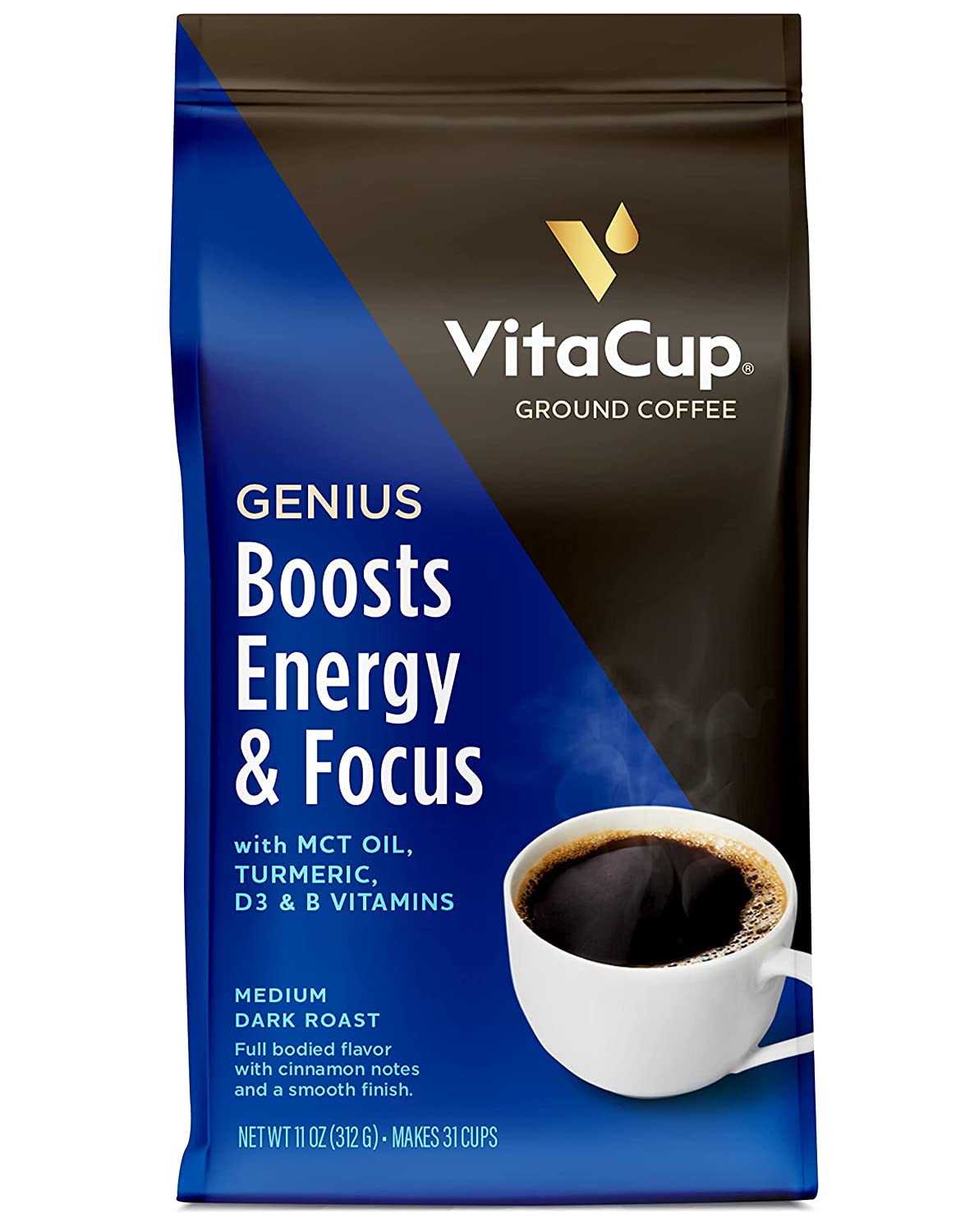
VitaCup Genius makes it to the top of our rankings thanks to its innovative combination of MCT oil, B-vitamins, and turmeric alongside quality 100% arabica coffee.
The MCT oil gives an extra boost to anyone on a ketogenic or low-carb diet, and the B-vitamins help augment the energy boost you get from caffeine. Add to that the potent effects of turmeric and you’ve got an excellent all-around option for turmeric coffee and our number one overall pick.
2. Starbucks Medium Roast with Golden Turmeric
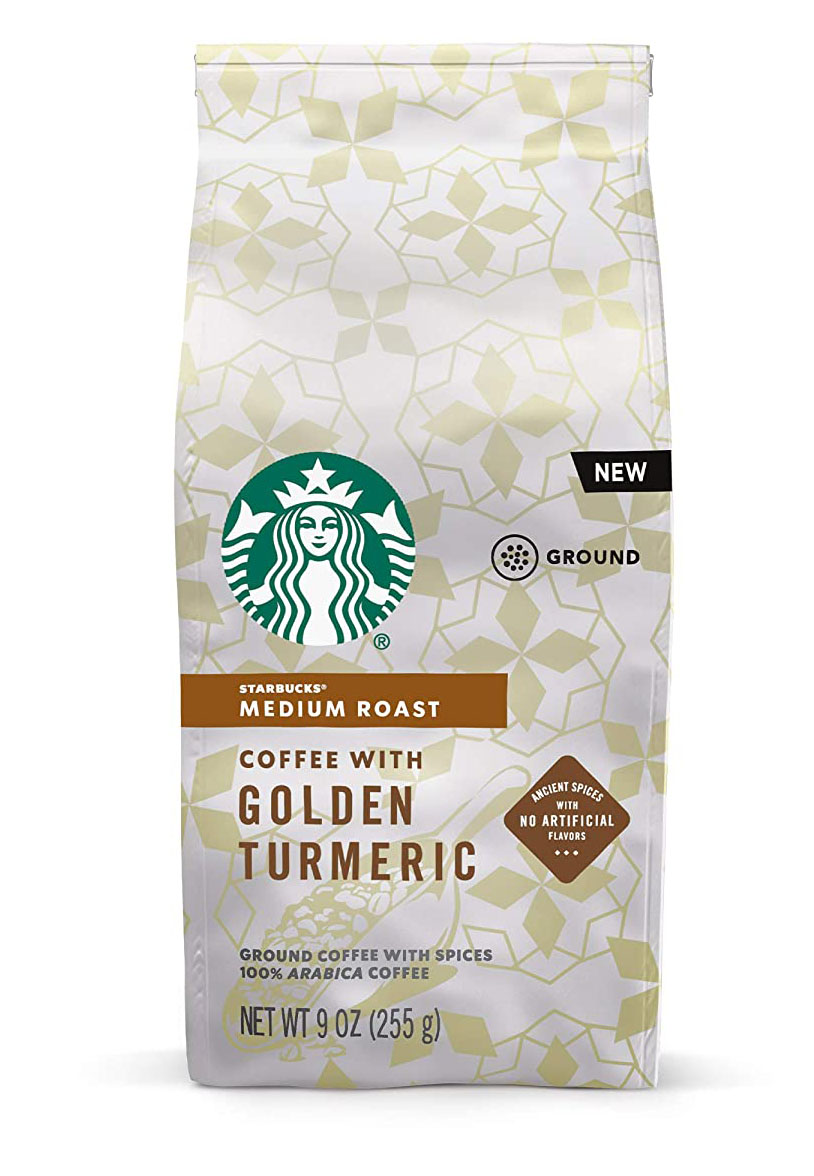
Starbucks’ medium roast adds turmeric with ginger and cinnamon for a warm, spicy taste and a surge of antioxidant-containing superfood extracts.
If you want ground coffee that’s ready to brew and already has turmeric added in, there’s no better option out there–the classic, reliable flavor from Starbucks pairs well with the spicy, earthy taste of turmeric.
3. Laird Turmeric Superfood Creamer
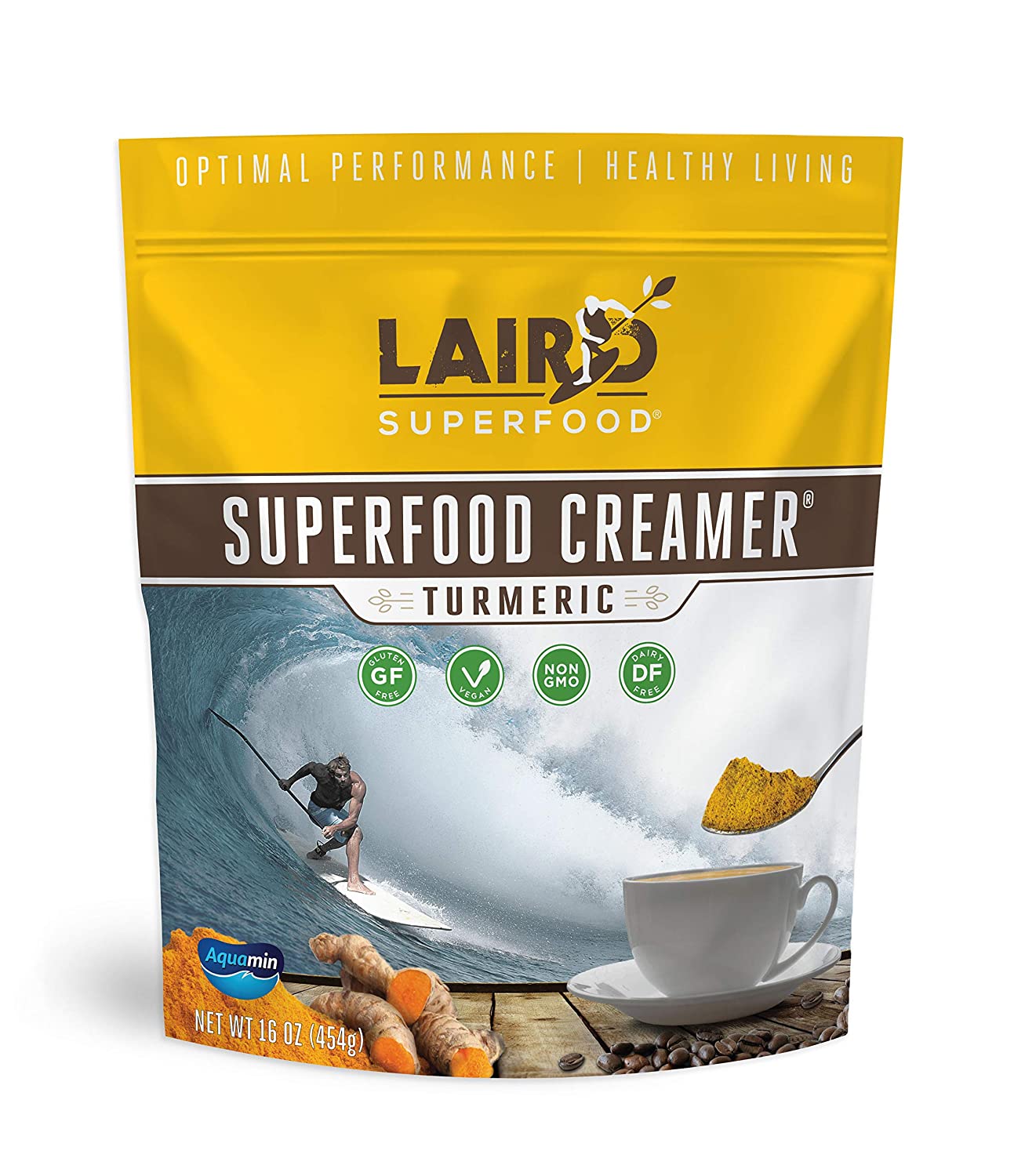
Want to use your favorite coffee for turmeric coffee but don’t want to bother with raw turmeric?
Laird Superfood Creamer is a great choice if you take creamer with your coffee: instead of the usual style of coffee creamer that’s loaded with sugar and genetically modified plant oils, Laird uses coconut milk powder, coconut sugar, and turmeric powder to create a creamer that turns any coffee into a turmeric-infused drink.
4. VitaCup Genius Coffee K-Cups
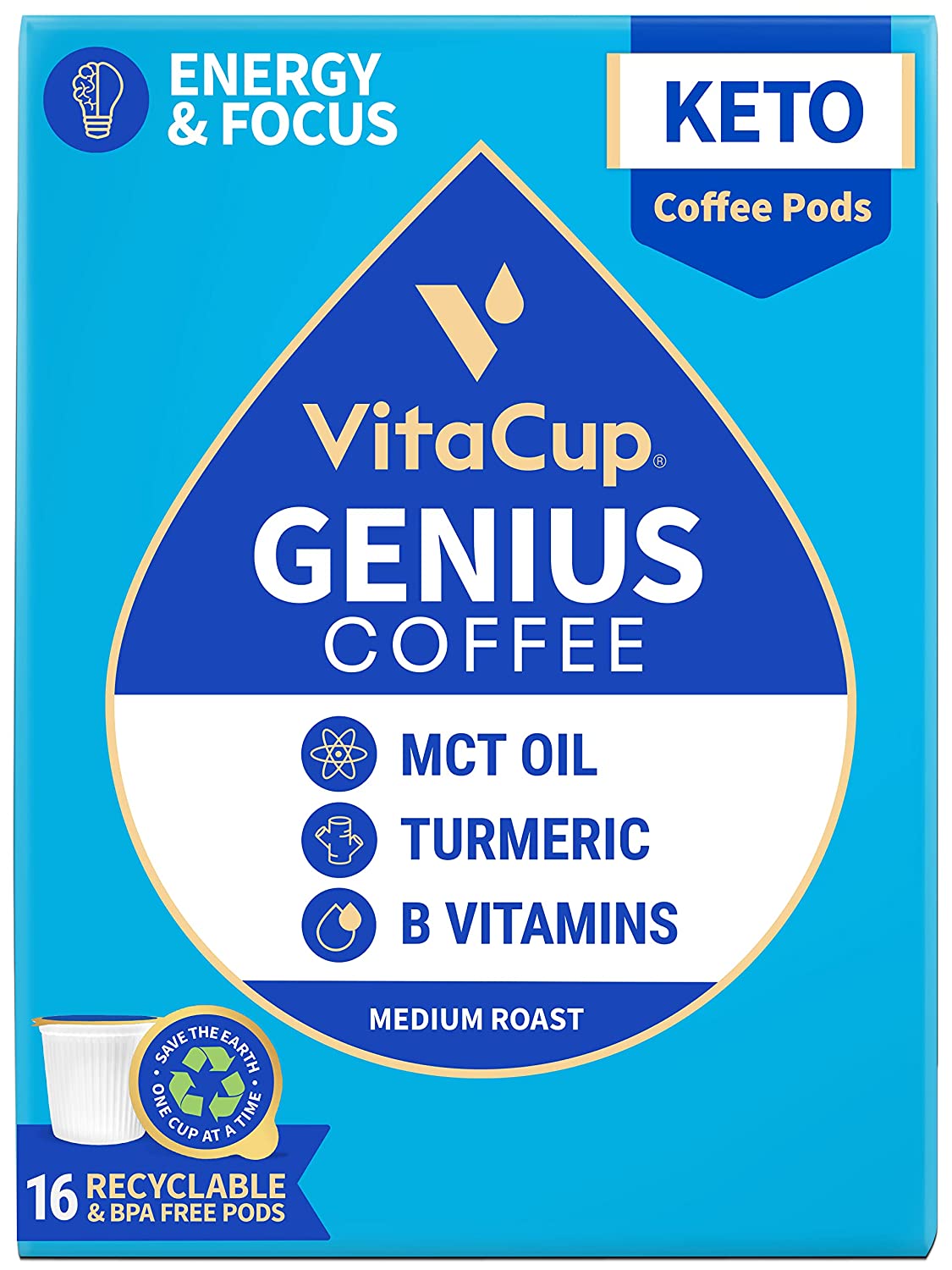
VitaCup is super convenient if you make most of your coffee with a Keurig-style machine. This turmeric coffee combines turmeric with MCT oil and B-vitamins for a supercharged turmeric coffee.
The instant availability from the Keurig maker and the extra MCT oil makes this a particularly good coffee for people on the keto diet.
5. Starbucks Medium Roast K-Cups with Golden Turmeric
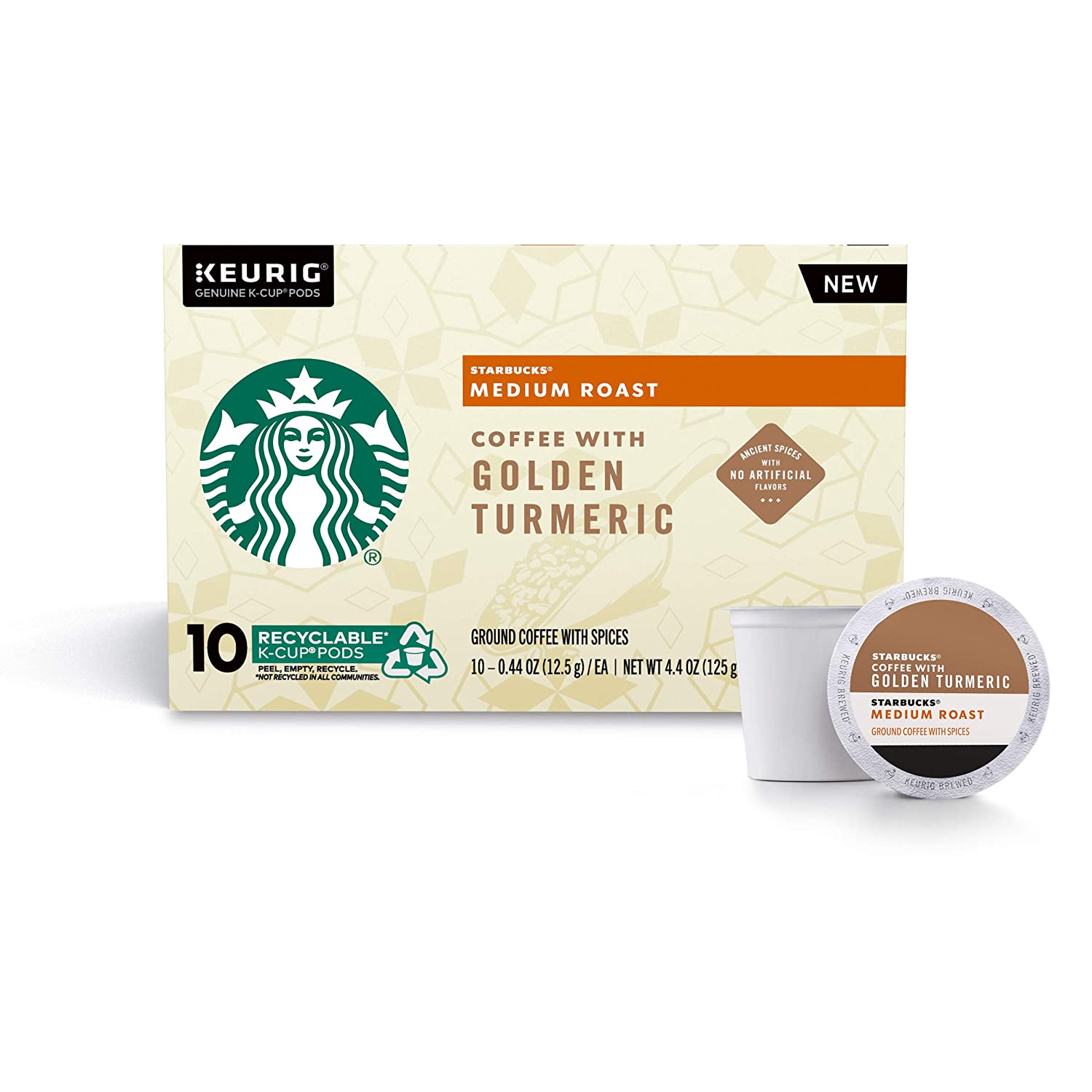
When it comes to Keurig-style coffee, it’s hard to beat Starbucks on taste and consistency. These K-cups combine their classic medium roast coffee with golden turmeric for a turmeric coffee blend that’s hard to beat when it comes to both convenience and taste.
6. Anthony’s Organic Turmeric Powder
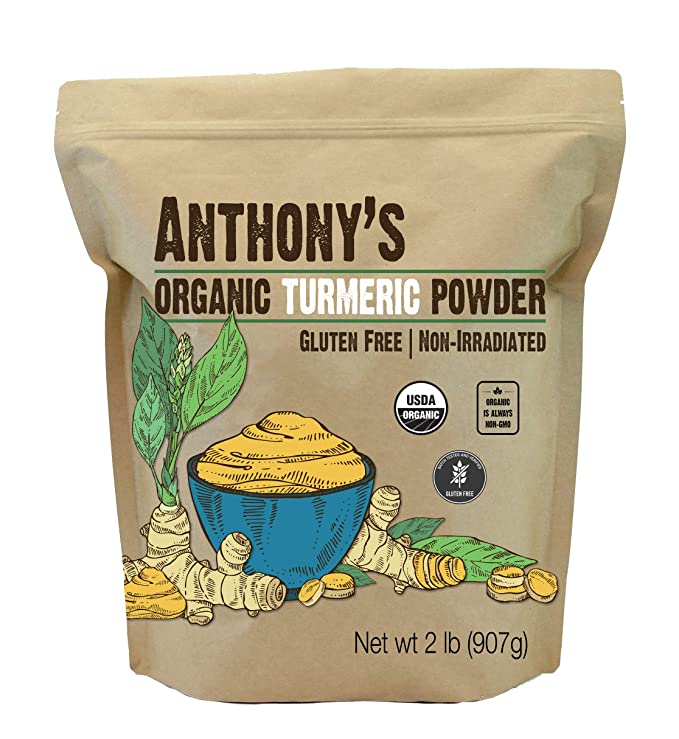
Don’t see your favorite type of coffee in our turmeric coffee rankings? Try blending up your own with Anthony’s Organic Turmeric Powder.
This is the perfect solution for coffee aficionados who want the benefits of turmeric coffee but don’t want to have to give up their favorite coffee beans. When added to coffee grounds, or briskly mixed into already-brewed coffee, it lets you soup up the antioxidant power of any type of coffee.
7. Vahdam Superfoods Turmeric Coffee
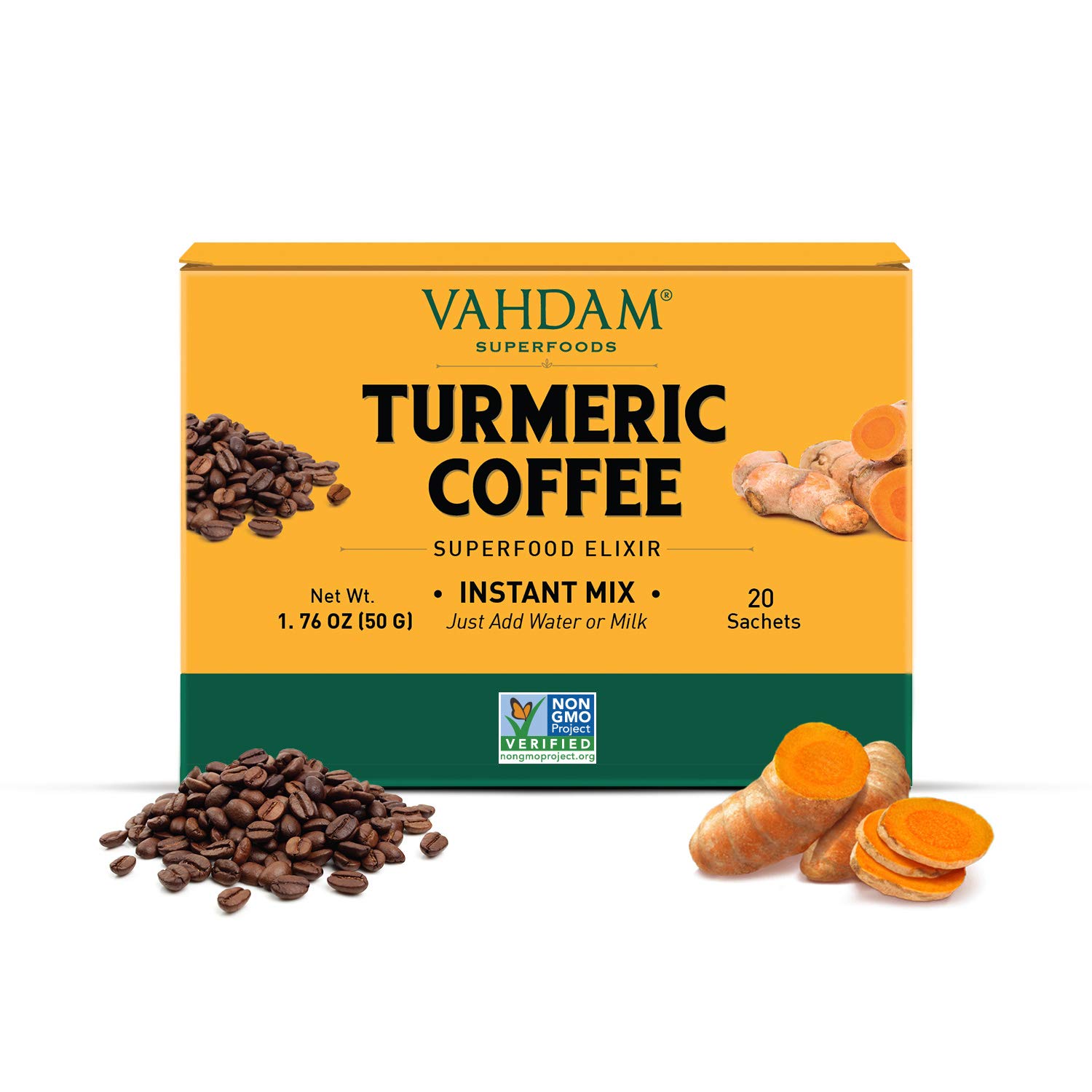
Vadham makes a quick and easy instant coffee mix that combines 100% arabica coffee with non-GMO turmeric powder.
It blends up easily in hot water, making it a great option for coffee on the go, and the black pepper boosts the rate of turmeric absorption, making this a particularly potent turmeric coffee. It’s a good choice for traveling, camping, or other situations where you don’t have access to your usual coffee maker.
8. Nature’s Harvest Turmeric Latte Mix
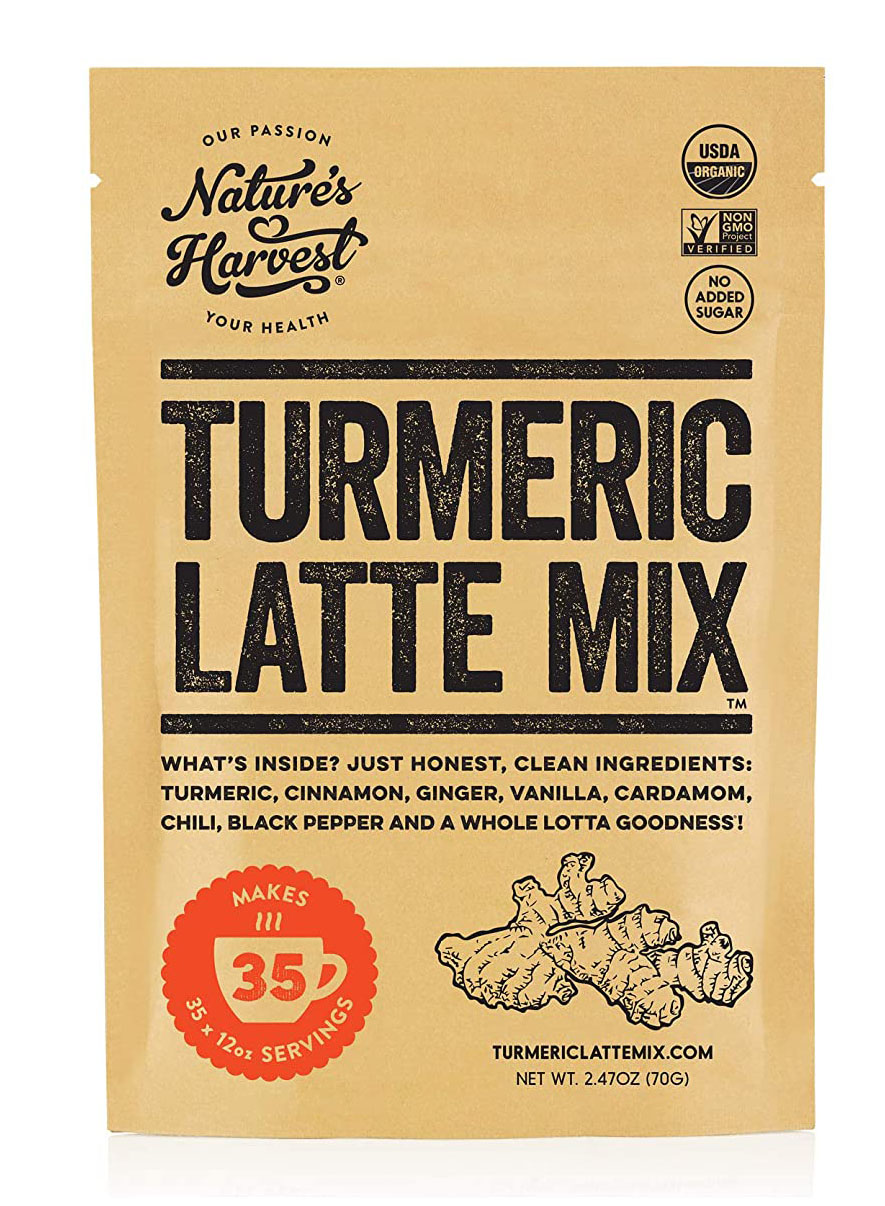
Nature’s Harvest is one of several turmeric coffee products that focus on delivering turmeric via a latte mix.
It combines turmeric with black pepper, cinnamon, ginger, vanilla, chili peppers, and cardamom for a broad-ranging blend that delivers a solid amount of antioxidants, albeit spread across the different compounds included.
9. BareOrganics Cardio Care Coffee
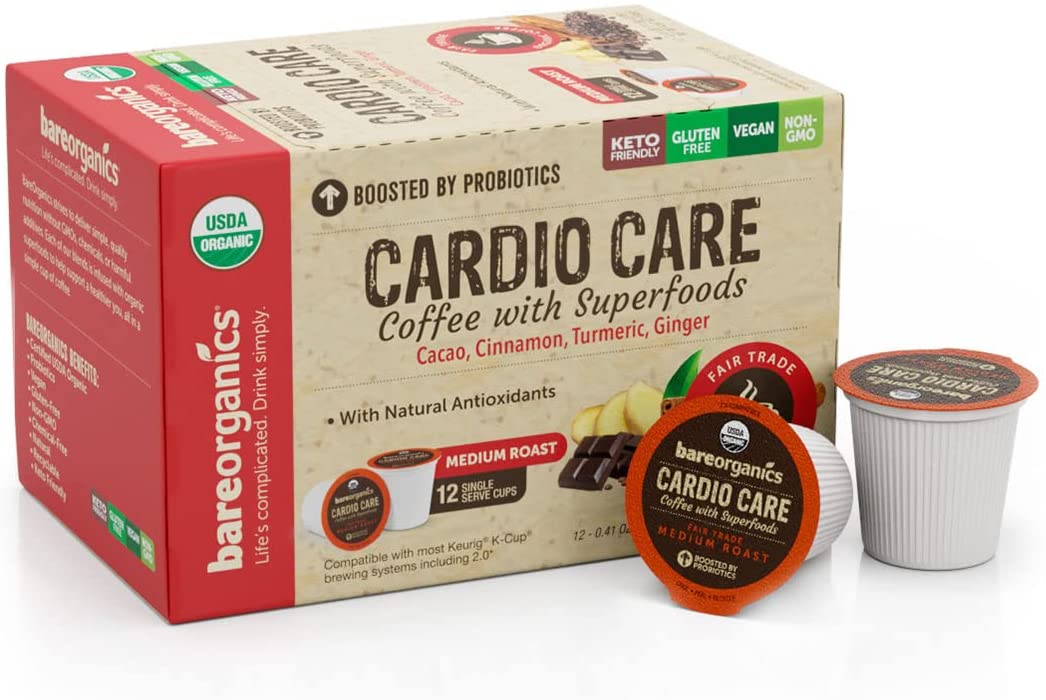
Cardio Care Coffee combines turmeric with other heart-healthy compounds like ginger powder, cinnamon powder, and one billion CFUs of bacillus coagulans probiotic bacteria.
It’s a unique way to get multiple heart-healthy ingredients in a K-cup, though as with some of the other multi-ingredient turmeric coffees out there it suffers from a low dosage of turmeric itself.
10. Ginger People Turmeric Latte Mix
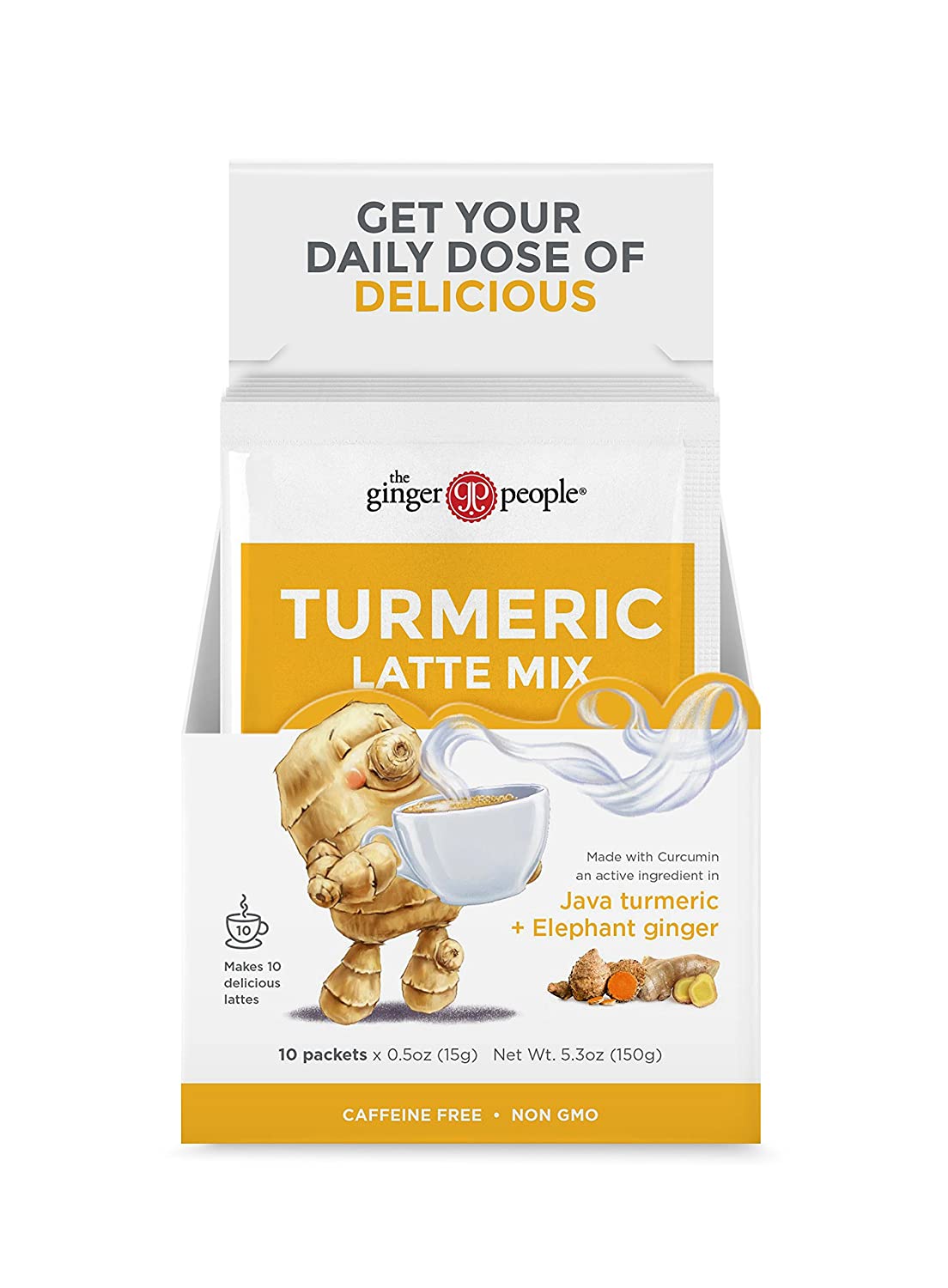
Ginger People makes a blend of turmeric and ginger that comes in single-use packets that you can mix into your coffee, even on the go. While the convenience is nice, the dosage of turmeric is low enough that most people will be better-suited by going for another option.
Category winners
Best turmeric coffee overall: VitaCup Genius Ground Coffee
VitaCup Genius is our top overall pick thanks to its combination of turmeric, MCT oil, and B-complex vitamins. This turmeric coffee is great both for cognitive performance and long-term health, and this versatility plus the high-quality ingredients makes it our overall winner.
Best turmeric for DIY turmeric coffee: Anthony’s Organic Turmeric Powder
Want to blend up your own turmeric coffee? Anthony’s is the way to go: this organically-certified turmeric powder is ultra-pure and finely powdered which makes it easy to mix into your coffee of choice. Add to fresh-ground coffee and you’ll be able to brew up your own turmeric coffee with your favorite coffee beans.
Best turmeric coffee for the keto diet: VitaCup Genius Ground Coffee
Keto dieters can really benefit from the inclusion of MCT oil and B vitamins in VitaCup Genius Ground Coffee, since MCT oil provides healthy fats for more ketogenic energy generation, and B-vitamins boost overall energy levels and vigor.
With more energy, less inflammation, and the fat-oxidizing effects of caffeine, VitaCup is the perfect companion for the keto diet.
Best turmeric coffee creamer: Laird Superfood Creamer
If you take your coffee with creamer, and want to stick with your favorite coffee beans while still getting the benefits of turmeric coffee, Laird Superfood is the perfect choice.
This superfood creamer is nothing like your typical sugar and processed-oil-laden creamer: it uses coconut oil, coconut sugar, and a healthy amount of turmeric to turn any coffee into a superfood-boosted turmeric coffee.
Best turmeric coffee with black pepper: Vahdam Superfoods Turmeric Coffee
Black pepper and turmeric are a great combination, because the piperine (black pepper extract) in black pepper helps boost the absorption of curcumin, the most important biologically active compound in turmeric.
If you want to take advantage of this synergistic interaction, Vahdam is our recommendation: it contains ample amounts of both turmeric and black pepper extract, making its turmeric content particularly effective.
Best turmeric coffee for Keurig coffee makers: VitaCup Genius Coffee K-Cups
VitaCup, our top overall pick, also makes a Keurig-compatible pod that is the best way to get instant, high-quality turmeric coffee. You get the same blend of coffee, turmeric, MCT oil, and B vitamins, packed into a recyclable K-cup that makes it dead-simple to add turmeric coffee to your morning routine.
Who should buy turmeric coffee?
Turmeric coffee is a good option for people who already drink coffee on a regular basis and are looking for a way to amp up its health benefits by adding more antioxidants.
Turmeric is a potent antioxidant and is widely used for its anti-inflammatory purposes, and while it can be taken on its own, it combines well with the metabolism-boosting and fat-burning properties of the caffeine in coffee.
On top of that, turmeric coffee is an excellent choice for weight loss and for preserving cognitive function as you get older. Turmeric coffee is particularly popular with people who have cognitively demanding jobs and are looking to elevate their cognitive performance.
Coffee, of course, is a well-known nootropic, but adding the neuroprotective effects of turmeric into the mix is a strategy that’s increasingly being used for cognitive performance.
For the same reasons, turmeric coffee is great for older adults who have coffee on a regular basis: turmeric supplements are promoted by many health experts for its potential to protect your cognitive function as you get older, and integrating turmeric with coffee is a super-simple way to increase your turmeric intake.
Instead of adding yet another pill to your daily routine, you can change up your morning cup of coffee with an ingredient that’s both tasty and healthy–turmeric coffee is a great fit for this purpose.
How we ranked
People prepare coffee in a lot of different ways, so to make sure our rankings encompassed this diversity of preparations, we developed our initial list from the full range of ways to add turmeric to coffee: ground coffee with turmeric mixed in for drip coffee makers, K-cups for Keurig machines and similar instant hot coffee preparations, turmeric-based latte mix, turmeric-fortified instant coffee mix, and raw turmeric powder for people who grind their own coffee beans.
Within these categories, we stratified based on turmeric dosage and quality of the coffee ingredients, giving points to turmeric coffee products that deliver a more concentrated dose of turmeric and used higher-quality sources for their coffee.
We eliminated many of the multi-ingredient latte mixes because the turmeric content just wasn’t high enough to have a significant biological effect.
We then looked to see which products contained additional beneficial ingredients alongside turmeric, like MCT oil and B-vitamins, which are great for people on low-carb and ketogenic diets, or black pepper, which is known to enhance the bioavailability of the active ingredient in turmeric.
This helped products like VitaCup and Vadham Superfoods climb higher up in the rankings.
Within the products designed to be added to coffee after brewing, like turmeric latte mixes and creamers, we rewarded products that stuck to high-quality ingredients and didn’t load up on sugar and vegetable oils.
This allowed products like Laird’s Superfood Creamer, which uses all-natural coconut products for flavoring and composition, to climb higher up in the rankings. Other products that had more sugar or more extraneous ingredients, like Nature’s Harvest and Ginger People, ended up lower in the rankings for the same reason.
Lastly, we compiled our final rankings by sorting the remaining products both by quality and versatility. VitaCup and Starbucks took the top spots thanks to how easy it is to use them instead of traditional ground coffee, and K-cup products from these same brands were close behind for the same reason.
Benefits
Turmeric coffee can cut down on systemic inflammation inside your body. One of the primary appeals of turmeric coffee is the powerful anti-inflammatory effects of the biologically active curcumins found in turmeric.
A review study published in 2004 in the Journal of Alternative and Complementary Medicine summarized the findings of several lab-based studies, which showed that turmeric or its isolated curcumin compounds inhibit several pro-inflammatory agents inside the body, leading to lower levels of systemic inflammation (1).
Turmeric has even been investigated as a treatment for arthritis thanks to these anti-inflammatory properties: A 2016 study published in the Journal of Medicinal Food reviewed results from several clinical trials that showed some potential for supplemental turmeric to cut down on arthritis-related pain and improve mobility (2).
Turmeric in coffee can reduce markers of oxidative stress. Oxidative stress is a biochemical process that is suspected to be related to the development of many chronic diseases, including cardiovascular disease, cognitive decline, and even aging itself.
In lab animal studies, turmeric has been found to cut down on several biomarkers of oxidative stress: A 2018 study published by researchers in Iran noted several studies that found inhibitory properties of turmeric on levels of interleukin 6, c-reactive protein, and other indicators of oxidative stress (3).
These findings suggest that turmeric coffee (which combines the antioxidant effects of turmeric with even more antioxidants found in coffee) could play a role in preventing or slowing the progress of chronic diseases and aging.
Turmeric coffee could improve cognitive function in older adults when consumed on a regular basis. Because turmeric has such a powerful antioxidant and anti-inflammatory effect, researchers have been hopeful that it could be useful for maintaining healthy brain function later in life.
Some promising initial research suggests this might be the case: one study published by researchers at the University of Rio de Janeiro showed that turmeric supplementation increased blood flow and oxygenation to the prefrontal cortex, an area of the brain connected with complex cognitive functions (4).
Other findings have shown that curry consumption (a proxy measurement for turmeric intake) is associated with better performance in cognitive tests in older adults (5).
Though these findings are preliminary, they suggest that turmeric could exert strong neuroprotective effects, helping to preserve brain function and cognitive capacity as you get older.
Coffee itself may exert additional cognitive benefits in older adults. Coffee is one of the most popular ways to boost cognitive function, and people usually assume that its benefits are due to its caffeine content.
However, some interesting research suggests that coffee can enhance or protect cognitive function even beyond its caffeine content.
One study conducted psychological testing in younger and older adults after taking either coffee or decaf coffee, and found that several aspects of cognitive function were improved even after drinking decaf coffee (6), indicating that something beyond merely the nootropic effects of caffeine are at play when it comes to coffee’s cognitive benefits.
Moreover, some research has found that coffee consumption in older adults is associated with a lower risk of cognitive decline and dementia: a 2015 review study highlighted several findings that suggested coffee consumption lowers risk of cognitive impairment as you get older, although more research is needed on how dosage and caffeine interact with the other compounds in coffee to modulate these effects (7).
These findings strengthen the case for using turmeric coffee to sustain or boost cognitive function as you get older, since coffee’s potential neuroprotective effects likely work through different mechanisms than the neuroprotective effects of turmeric.
Adding black pepper or black pepper extract to your turmeric coffee could substantially boost its absorption. One interesting research finding regarding the bioavailability of turmeric is its interaction with piperine, the biologically active compound in black pepper and black pepper extract.
Some groundbreaking research in this area was done in the late 1990s at St. John’s Medical College in India, where researchers showed that piperine from black pepper strongly amplified the absorption and elimination of curcumin from turmeric in both humans and animals (8).
When taken in combination with piperine, turmeric-derived curcumins are absorbed over 150% more effectively, and blood levels of curcumin peak substantially earlier. These findings suggest that adding piperine to your turmeric coffee (which will give it a peppery kick) or taking a piperine supplement at the same time as your turmeric coffee are both great ways to amplify the benefits of turmeric coffee.
Turmeric coffee could play dual roles in helping you lose weight. Both coffee and turmeric have been studied for weight loss, and some research indicates that they could play complementary roles when used as part of a weight loss routine.
On turmeric’s part, several studies have examined its ability to boost weight loss; the findings from 18 of these such studies were synthesized in a meta-analysis published in the journal Frontiers in Pharmacology in 2019 (9).
This review found that turmeric supplementation helped decrease BMI, decrease hormones related to feelings of hunger, and increased hormones that promote healthy regulation of lipid and insulin levels inside fat cells. These findings suggest that turmeric has wide-ranging and beneficial effects on your body’s ability to regulate body fat levels.
Coffee plays a complementary role by boosting fat oxidation and energy expenditure, both through the effects of caffeine and through other pathways.
According to research published in the American Journal of Clinical Nutrition, regular caffeine consumption increases overall energy expenditure throughout the day, both in healthy adults of a normal weight and in adults who have recently lost weight (10).
Some of the benefits of coffee appear to be independent of its caffeine content: for example, one study with data from over one million people examined whether risk of type 2 diabetes (which is connected to metabolic health and weight regulation) was lower among habitual coffee drinkers (11).
This study took care to stratify coffee drinkers into those who drank decaf coffee and those who drank regular coffee.
The findings revealed that coffee consumption was associated with a lower risk of type 2 diabetes, regardless of whether the subjects drank regular coffee or decaf. This suggests that other biologically active compounds in coffee, like cholinergic acids, might be responsible for some of the benefits of coffee for weight loss.
Because turmeric and coffee work to boost weight loss through different biological pathways, combining them together in turmeric coffee is a great way to increase their efficacy.
Turmeric coffee, when blended without sugar-heavy additives or creamers, is a great health drink that can promote weight loss and is compatible with pretty much every diet out there.
Turmeric coffee can influence several risk factors for cardiovascular disease. Like many powerful antioxidants and anti-inflammatories, the biologically active curcumin compounds in turmeric coffee are of interest to many nutrition researchers because of their potential to decrease the risk of heart disease.
Several studies have explored this possibility, and the findings of some of the best research on this front were summarized in a 2017 meta-analysis published in Nutrition Journal by a team of researchers in China (12).
The researchers pooled data from over 600 different subjects across seven different studies. The results showed that turmeric was able to reduce levels of LDL (“bad”) cholesterol, total cholesterol, and total blood triglycerides, both in otherwise healthy people and in people with metabolic syndrome.
These findings suggest that turmeric coffee could combine these cardiovascular benefits with the well-known health benefits of coffee, which include its antioxidant capabilities and its potential to improve metabolic function (13).
Side effects
Turmeric coffee might cause mild gastrointestinal discomfort. Turmeric is widely used in cooking in India and Southeast Asia, so its safety profile is well-known and it is very safe.
Based on research using pure turmeric as a supplement, the only common side effect is mild gastrointestinal discomfort, gas, and flatulence, which usually improves over time.
Turmeric coffee could cause jitteriness, anxiety, and sleeplessness. Coffee, of course, has its own side effect profile, which includes all of the well-known negative effects of caffeine and coffee: jitteriness, anxiety, and sleeplessness (though this reason is often why people drink coffee), plus stained teeth.
Turmeric is not known to interact or amplify with any of these side effects of caffeine. Keep these side effects in mind and track your overall caffeine intake as well–other supplements like green tea extract or pre-workout supplements can add to your daily caffeine intake without you noticing it.
Turmeric coffee might not be a good option for people with irritable bowel syndrome. Turmeric has shown some potential in research studies for treating irritable bowel syndrome, in part thanks to its antioxidant capabilities–for example, one meta-analysis found that IBS patients benefited from reduced inflammation and improved gut bacteria populations after supplementation with turmeric (14).
However, coffee is commonly cited as a troublesome food that can aggravate IBS: one study published in 2021 found associations across several different sub-populations indicating that coffee intake exacerbates the symptoms and incidence of irritable bowel syndrome (15).
While no studies have directly examined whether the benefits of turmeric for IBS outweigh the potential negatives of coffee, it’s probably safer to opt for a turmeric supplement, versus drinking turmeric coffee, if you have irritable bowel syndrome.
Recommended dosage
Getting the dosage of turmeric coffee right requires optimizing both your coffee intake and your turmeric dosage.
When it comes to coffee, the research on the biological effects of coffee and caffeine make it pretty clear that one to two cups of coffee delivers an optimal balance between beneficial effects (appetite suppression, thermogenesis, cognitive function, etc.) and potential side effects, like jitteriness.
For turmeric, the optimal dosage appears to be around 2.5 to 5 grams of raw turmeric, which is about the same as half a teaspoon to one full teaspoon of raw turmeric powder.
These figures come from research on supplemental curcumins, the biologically active compounds in turmeric that are thought to be responsible for the health benefits of turmeric.
A typical dosage of curcumins in a research study is around 80 mg (16), and raw turmeric powder is about 2-8% curcumins by weight, with most sources pegging the number right around 3% (17). At this concentration. 2.5-5 grams of raw turmeric powder delivers 75-150 mg of pure curcumins, which is just right.
For coffee, the right intake seems to be no more than three to five cups per day total, based on large-scale population-based research on the health benefits of coffee (18).
For the more specific cognitive and physical performance benefits of coffee, you can get maximum benefits from just two to three cups of coffee (19).
Keep in mind that these figures come from a standardized measure of coffee in which a “cup” is really only six fluid ounces (the size of a small diner mug), not the usual eight to 12 fluid ounces that most people actually drink.
Balancing both turmeric and coffee dosages, the right amount of turmeric coffee looks like one to two cups per day, with one half to one full teaspoon of turmeric added, or its equivalent in concentrated curcumins.
FAQ
Q: How do you make your own turmeric coffee?
A: Making turmeric coffee is easy if you have a high quality raw turmeric powder, like some of the options listed in our rankings like Anthony’s Raw Turmeric.
Most people add about half a teaspoon to one teaspoon of turmeric to their cup of coffee and quickly mix it up in the solution, but you can add the same amount to the raw coffee grounds before you brew your coffee (just make sure it’s well-mixed into the coffee grounds and not concentrated in one spot).
Q: How much turmeric should you put in your coffee?
A: For one cup of turmeric coffee, half to one full teaspoon of turmeric powder is a good dosage: this delivers about 2.5 to five grams of raw turmeric, which on average delivers 75 to 150 mg of bioactive curcumins.
Given that a typical supplementation regimen of turmeric calls for around 80 mg of curcumins, this dosage is just right to deliver the right amount of turmeric.
Q: What does turmeric coffee taste like?
A: Turmeric adds an earthy, spicy accent to the flavor profile of coffee: unlike some coffee additives, it doesn’t overwhelm the natural taste of your coffee beans, which is great if you are choosy with what kind of coffee beans you use to make coffee.
Q: How often can you make turmeric coffee?
A: Thanks to the excellent safety profile of turmeric, you can make turmeric coffee on a daily basis. Our research indicates that optimal intake for health is around one to two cups of turmeric coffee per day.
Q: Can you add turmeric to mushroom coffee?
A: Yes, turmeric is an excellent addition to coffee that’s already boosted with medicinal mushrooms: you can either add raw turmeric to the ground coffee before brewing, whisk turmeric powder into mushroom coffee after brewing, or use a turmeric-based latte mix or creamer. Adding turmeric is a great way to amplify the anti-inflammatory properties of mushroom coffee.
Q: Can turmeric coffee help with inflammation?
A: Yes, one of the most heavily researched uses of turmeric has been its ability to cut down on inflammation in the body: these benefits have motivated studies on topics as varied as arthritis and metabolic syndrome.
The anti-inflammatory benefits of turmeric can be traced both to the antioxidant activity of curcumins in turmeric and the cholinergic acids found in coffee.
Both have research supporting their use to cut down on markers of inflammation in the body, making turmeric coffee a great way to fight inflammation-linked health problems.
Q: Can you add turmeric to tea instead of coffee?
A: Yes, turmeric tea is a nice alternative to coffee if you don’t want the caffeine in coffee late in the day. To make turmeric tea, you can add turmeric powder to hot water alongside lemon, honey, and black pepper to boost turmeric absorption.
Q: Is turmeric coffee good for weight loss?
A: Turmeric coffee can have some excellent weight loss benefits, but you’ve got to prepare it right. While many people add lots of cream, sugar, and flavoring to their coffee, these are bloated with sugar and vegetable oils that add to your calorie and carbohydrate intake.
Coffee has excellent weight loss properties: it boosts your metabolism and dampens down your feelings of hunger. Turmeric augments this by increasing levels of antioxidants in your body and cutting down on inflammation, which is one of the primary problems associated with being overweight.
So, how do you avoid the drawbacks of some turmeric coffee preparation when trying to lose weight? Use coffee grounds fortified with turmeric, instead of relying on a creamer or latte mix to add turmeric to your coffee. This way, you get the benefits from both coffee and turmeric, without the negatives of added sugar.
Q: Is drinking turmeric coffee better than taking turmeric capsules?
A: When it comes to the biological effects of turmeric, the exact delivery mechanism (pills vs. a liquid, like turmeric-fortified coffee) is not particularly important.
So, as long as you are taking the same turmeric dosage, you’ll get the same effect. The only additional point to consider on this front is that many turmeric supplements also contain black pepper extract (i.e. piperine, sometimes in a commercialized form known as BioPerine).
This added natural extract can result in substantial boosts in the absorption of turmeric, which means that a black pepper fortified turmeric capsule would result in more curcumins being absorbed into your system than drinking a cup of turmeric coffee with the same dosage, if that turmeric coffee didn’t have any black pepper extract added to it.
Fortunately, if this is a concern, some turmeric coffee products already come with black pepper extract included for maximum bioavailability.
Q: Is turmeric coffee good for the keto diet?
A: Turmeric coffee is an excellent addition to the keto diet, since it combines well with keto-friendly coffee formulations like “bulletproof” coffee fortified with MCT oil.
Indeed, our top-ranked turmeric coffee (VitaCup) includes both MCT oil and B-vitamins, which make it great for the keto diet.
Turmeric adds no calories or carbohydrates to coffee, but amplifies its antioxidant and anti-inflammatory properties. On top of that, the caffeine in coffee upregulates your body’s fat oxidation, helping sustain ketosis and its beneficial effects.
The only caveat to watch out for is turmeric-based coffee additives: creamers and latte mixes are usually not keto-friendly, because they use sugar to add sweetness. So, if you want to make keto-friendly coffee, use turmeric-fortified coffee grounds or add raw turmeric powder to your brewed coffee, instead of relying on a creamer or latte mix.
Q: How long does turmeric coffee take to start working?
A: Turmeric coffee will start to kick in after about one hour, and will have its full effect within two hours. This number comes out of two simultaneous effects: first, the rate at which the caffeine and other biologically active compounds in coffee are absorbed into your body, and second, the rate at which the curcumins in turmeric are absorbed into your body.
On the caffeine front, according to a 2005 review of the biological effects of caffeine, over 99% of a dose of caffeine (e.g. 99 mg of the the ~100 mg of caffeine in a cup of coffee) is absorbed within 45 minutes, and blood levels reach a sustained peak soon after–after an hour, you can count on having the full effect of a cup of coffee (20).
On the turmeric front, pharmacokinetics research suggests that turmeric induces a surge in blood levels of curcumins that peaks approximately one to two hours after ingestion (21).
Notably, this can be sped up by taking black pepper extract (a.k.a. piperine) at the same time: doing so achieves peak absorption in one to two hours instead, so if you want your turmeric coffee to start having an effect sooner, get a turmeric coffee that also includes black pepper.
Q: How long does turmeric coffee stay in your system?
A: For most people, the effects of turmeric coffee wear off after about five hours. As with the previous question on how long it takes for turmeric coffee to have an effect, two factors need to be taken into account when determining how long it takes for turmeric coffee to wear off.
First, the caffeine in the coffee: for most people, the effects of caffeine drop off by half every 2.5-3 hours. Notably, though, this can be extended to up to 10 hours in women on certain types of birth control. For everyone else, though, five hours later you’ll only have 25% of the original amount of caffeine in your system (and this will have dropped to 12% in six hours).
For turmeric, blood levels of the biologically active curcumins tail off after about five hours from taking curcumin. Though taking black pepper extract at the same time boosts the overall amount of curcumins absorbed, it doesn’t change the fact that their effects wear off after about five hours.
Q: Can you make decaf turmeric coffee?
A: Though our research team looked for decaf turmeric coffee on the market, we didn’t find any high-quality options. If you want decaf turmeric coffee, you’ve got two options: first, you can add high-quality raw turmeric to your own decaf coffee, either before or after brewing a cup.
Related articles
Recap
Turmeric coffee is an excellent way to add some antioxidant and anti-inflammatory power to your daily coffee.
If you are looking for a way to change up your coffee routine with a supplement that could protect your heart, sustain cognitive function, and combat pain and inflammation in your body, look no further than turmeric coffee.
For BodyNutrition’s #1 turmeric coffee recommendation, click here.